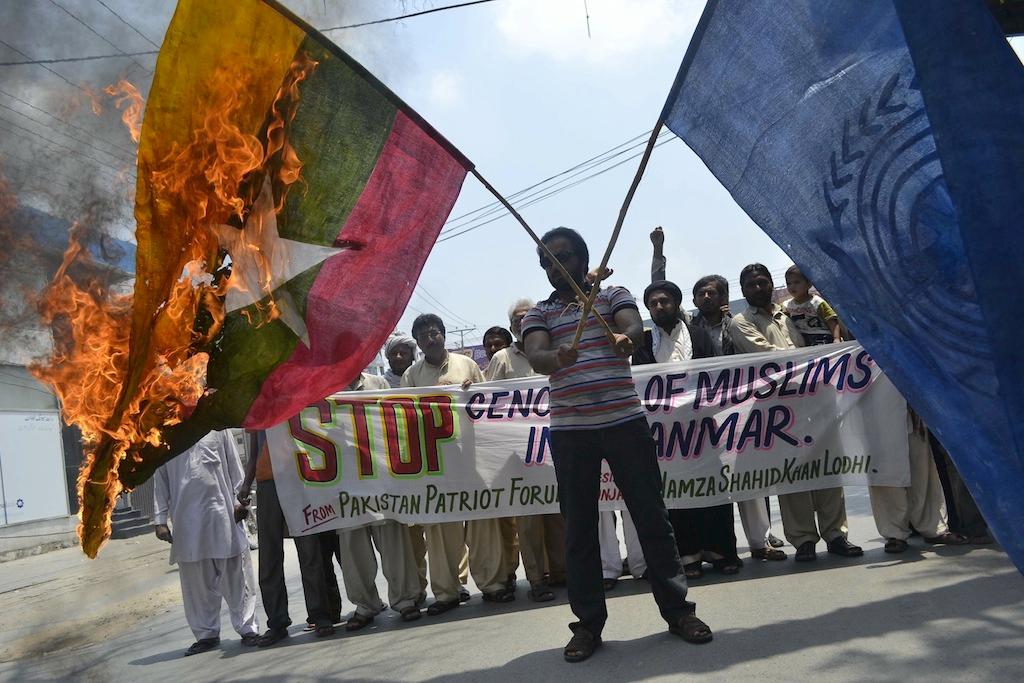Rohingya activist: Americans, say ‘yes’ to House Resolution 418
An activist holds a burning Myanmar and UN flag during a protest in Multan on July 22, 2012, against the killing of Muslims in Myanmar. Myanmar security forces have committed serious rights abuses against Muslims in violence-hit western Rakhine state during six weeks of emergency rule, Amnesty International said. Communal violence between ethnic Buddhist Rakhine and local Muslims, including the Rohingya, has left at least 80 people dead and forced tens of thousands out of their homes.
LONDON — The Myanmar government is trying to push us into camps or out of the country. In a few years, there may be no more of us left.
I stressed this message, as a human rights activist, during my remarks at a recent event hosted by the United States Holocaust Memorial Museum on the plight of Myanmar’s Rohingyas, one of the world’s most persecuted ethnic groups.
As I spoke, photographs capturing some of the Rohingya people impacted by the violence were displayed on the walls behind me: A woman holding her young grandchild after escaping with him to Bangladesh. A man left blind in one eye after being beaten while working as a forced laborer. Two young children sifting through rubble to find anything they can sell.
For decades, violence against the Rohingya, an ethic and religious minority, has been mostly ignored by others in Myanmar, and by the international community. I felt encouraged by the hundreds of audience members at the museum who had gathered to learn about the persecution that my community faces every day.
Speaking at the event was a powerful experience for me. Surrounded by the devastating history of the Holocaust, parallels began to emerge between that horrific violence of the last century and the attacks Rohingyas endure now in Myanmar, also known as Burma.
Like other minority groups that have faced persecution, the Rohingya have endured discrimination at the political, legal and cultural levels. Our community has been purposely written out of the official ethnic mosaic of Myanmar. The Rohingya have been denied citizenship even though our community has lived in Myanmar since the early seventh century, and had made significant contributions to public life before being rendered stateless.
We are not permitted to access health care or seek higher education just because we are Rohingya. We are banned from civil servant jobs, such as those held by doctors, nurses and teachers. We are not allowed to marry without permission, which can be a lengthy and expensive process that many Rohingyas simply cannot afford. I have friends who are serving long prison sentences for this so-called crime — getting married without permission.
Last summer, this long-standing discrimination erupted into outright violence. Buddhist extremists torched Rohingya villages were torched by in Rakhine state, killing people along the way. Others fled to camps for the internally displaced, where the humanitarian situation is hellish. Buddhist extremists have fueled the wave of hatred against Rohingyas by disseminating false and inflammatory material and anti-Muslim propaganda.
Forced from their homes and denied essential services, Rohingya people are turning away from violence in Myanmar to seek a better life elsewhere, even though getting out is exceedingly dangerous. Just last month, a boat sank between the Myanmar and Bangladeshi borders, leaving more than 60 people feared dead. Those who survived and returned to shore were promptly arrested, and no one has been able to contact them since.
Within Myanmar, there is little hope that the violence against the Rohingya will subside. To date, there is no powerful voice of compassion and peace that rises above the hatred. My people may face permanent erasure from their own country if the tide of violence and hate speech does not end soon.
It is sometimes difficult to know how to respond to such virulent hatred, but there are steps that Americans can take to help press the Myanmar government to address the violence.
People should call their representative in Congress and express support for House Resolution 418, which calls for an end to persecution of the Rohingya and other ethnic minorities in Myanmar. This piece of legislation will show the Myanmar leadership that the United States will speak up for Rohingyas and demand an end to violence and hate speech.
For members of my community and me, this kind of action also sends a message that others have heard about our plight and are doing what they can to end the injustice behind it. Such steps are also needed to give Rohingyas the courage and hope to keep fighting against this kind of discrimination, much like the event at the museum gave me.
Tun Khin is president and a founding member of the Burmese Rohingya Organization, which advocates for the rights of the Rohingya in Myanmar.
Every day, reporters and producers at The World are hard at work bringing you human-centered news from across the globe. But we can’t do it without you. We need your support to ensure we can continue this work for another year.
Make a gift today, and you’ll help us unlock a matching gift of $67,000!
